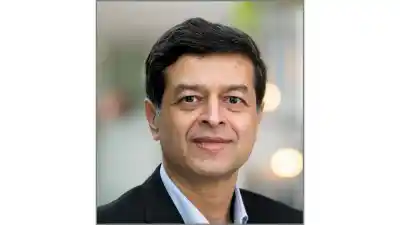In his 2023 Booker Prize-winning Prophet Song, Paul Lynch writes about an Ireland slipping into authoritarianism and a civil war follows. While the book can be seen as sending a strong political message, the Irish author thinks, “Fiction writers have to be careful. If they think their job is to send messages, then their work will probably fail to be considered serious. I think if you sit down to write a message, you make a political act, and you no longer are a serious writer.”
At the recently-concluded Samsung Galaxy Tab S9 Series Jaipur Literature Festival, the writer spoke with FE about how he sees his book in the current global context, what made him write on such a premise, why his book lacks paragraphs and quotation marks, and more. Edited excerpts:
You are the fifth Irish writer to win the Booker Prize. In 2023 itself, four authors from Ireland were long-listed for the award. What is it about the Irish literary scene that a country of a mere 5 million people has been able to produce such quality work?
There is a lot of energy in Irish writing right now, but it will take us 50 years or so to understand the reasons behind it.
However, one thing that is not much talked about is that Ireland is emerging from the theocratic hold of the Catholic church. So society is now post-Catholic, by and large. My generation and the generation after that are re-identifying ourselves, re-interpreting what it means to be Irish and what it means to communicate within a global context because Ireland is at the centre of the world now. It is an integral part of the globalised world. Now our fiction writers are looking outwards.
At the same time, the Irish government is very supportive of the writers. We have a tax-free ceiling of €50,000. Hence, if you keep your overheads low, you can be a full-time writer. And it matters as this means you can shape your brain around your work and produce your best writing, rather than being distracted—having to hold on to a job and taking out time in the evening to write.
So investing in the arts is paying off.
In your Booker Prize-winning novel Prophet Song, you write of Ireland slipping into authoritarianism, and a civil war ensues. What was the motivation for you to approach this theme?
If you are looking for an origin story, there isn’t one. However, in 2018, when I started writing this book, there was a slip in the political situation in the West. The world that we had known for long had started to erode—we had Trump, Brexit, and the crisis in Syria. Millions of refugees came out of that country, and in response to that, Europe started to turn to the right. A sort of nativist-nationalism started to kick in, in response to what was the biggest refugee crisis since the Second World War. I started to think, what was our response to this, and what this might lead to. It’s modern chaos, and I’m just trying to see through it, and this is what I am trying to write about.
While many have termed your book a dystopian novel, you don’t call it one. Why?
Whether it’s Margaret Atwood’s The Handmaid’s Tale or George Orwell’s 1984, they deliver a very particular political message. While Prophet Song is also doing that, I am not sure if it fits in. There’s a sense of realism. On the other hand, dystopia doesn’t read this mundane, this real. Also, a work of fiction ceases to be speculative when what’s going on in the book is happening somewhere in the world, which is exactly the case with Prophet Song, hence, it cannot be dystopian.
When I was in London, a woman from Ukraine came to me and said, “You’ve told my story.” And then somebody from Palestine said to me, “You’ve told my story,” and neither Ukraine nor Gaza was on my mind when I was writing.
How do you look at your book in light of the sweeping right-wing nationalism across several countries and the wars in Ukraine and Gaza? Also, do you think fiction, time and again, has failed to wake people up to this reality?
I think fiction writers have to be careful. If they think their job is to send messages, then their work will probably fail as a serious one. I think if you sit down to write a message, then you make a political act, and you no longer are a serious writer because serious fiction must speak to the complexities of modern life. However, at the same time, the outcome of the novel can have more value.
Prophet Song seems to communicate to the time that we are in as citizens. I look around and see there’s a generation coming through, a section of people who like the idea of authoritarianism and fascism, and I suppose what the book does is it reminds us what the outcomes of these ideologies can be, as they are inevitable.
There are no paragraphs or quotation marks in your book. Why?
When you start writing fiction, the first thing you think of is the form, the invisible mesh that holds everything together. Hence, the decisions you make help define the meaning of the book. So one of the things that I realised was that the book didn’t need paragraphs. I started to understand that the sense of what Eilish had been caught up in, there was no room to turn, there was no room to breathe—that’s claustrophobia. The reader feels imprisoned within the text the same way as Eilish is imprisoned in the unfolding reality that she is in, and so the form of the book is needed to meet that sense.









